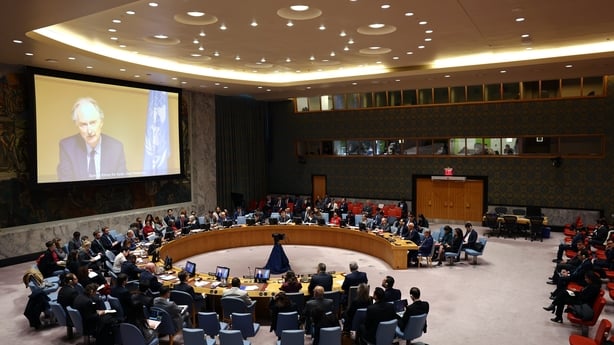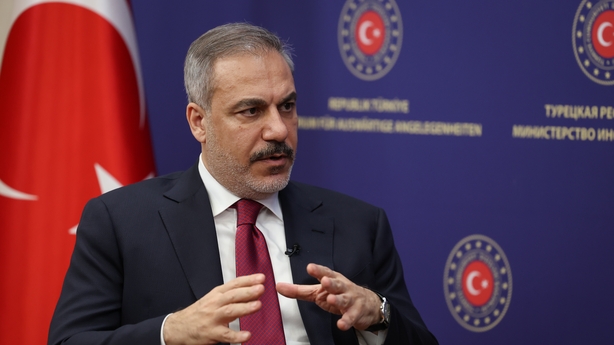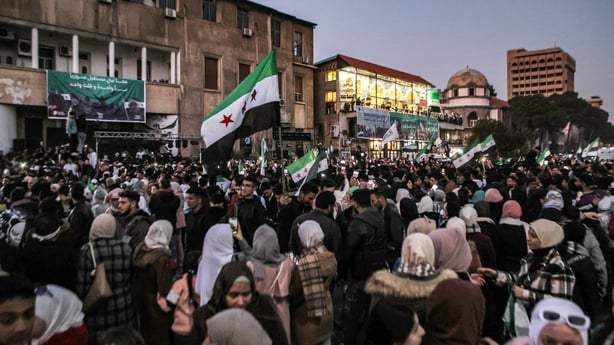Iraq has said it would begin repatriating Syrian troops who fled a lightning offensive that precipitated the ouster of president Bashar al-Assad.
"Today, the Iraqi authorities will start returning Syrian soldiers to their country after coordinating with the relevant Syrian authorities in this regard," interior ministry spokesman Miqdad Miri said.
Mr Assad fled Syria as an offensive spearheaded by the Islamist Hayat Tahrir al-Sham (HTS) closed in on Damascus, more than 13 years after his crackdown on democracy protests morphed into one of the deadliest wars of the century.
Taking city after city in a matter of days, the Islamist-led rebels faced little resistance and reached Damascus on 8 December.
At the time, an Iraqi security source said hundreds of Syrian soldiers who fled the front lines had been allowed through the Al-Qaim border crossing. Some had been wounded, the source said.
Today, Mr Miri said the soldiers would be repatriated through the same crossing.
Speaking on condition of anonymity, a senior Iraqi official said the repatriation would take place under "the supervision of international organisations".
Syria's new rulers have put out a call to soldiers and police to lay down their arms and register with the authorities.
Iraqi Deputy Commander of Joint Operations Lieutenant General Qais al-Mohammadawi told Iraqi media on Wednesday that the soldiers had had their "names, equipment and weapons carefully inventoried".

Earlier, the UN envoy to Syria has called for "free and fair" elections after the ouster of president Bashar al-Assad, voicing hope for a political solution for Kurdish-held areas.
Mr Assad fled Syria following a lightning offensive spearheaded by the Islamist Hayat Tahrir al-Sham (HTS), more than 13 years after his crackdown on democracy protests precipitated one of the deadliest wars of the century.
Years of civil war have also left the country heavily dependent on aid, deeply fragmented and desperate for justice and peace.
Addressing reporters in Damascus, UN special envoy Geir Pedersen said "there is a lot of hope that we can now see the beginning of a new Syria".
"A new Syria that... will adopt a new constitution... and that we will have free and fair elections when that time comes, after a transitional period," he said.
Calling for immediate humanitarian assistance, he also said he hoped to see an end to international sanctions levied against Syria over Mr Assad's abuses.
UN humanitarian chief Tom Fletcher called for a massive aid boost by donor countries to respond to "this moment of hope" for Syria.
"Across the country, the needs are huge. Seven in 10 people are needing support right now," Mr Fletcher told AFP in a telephone interview as he visited Syria.
Challenge in Kurdish-held regions
Mr Pedersen said a key challenge was the situation in Kurdish-held areas in Syria's northeast, amid fears of a major escalation between the US-backed, Kurdish-led Syrian Democratic Forces (SDF) and Turkey-backed groups.
Turkey accuses the main component of the SDF, the People's Protection Units (YPG), of being affiliated with Kurdistan Workers' Party (PKK) militants at home, whom both the US and Turkey consider a "terrorist" group.

The United States said on Tuesday that it had brokered an extension to a fragile ceasefire in the flashpoint town of Manbij and was seeking a broader understanding with Turkey.
However yesterday, a Syria war monitor said 21 pro-Turkey fighters had been killed after they attacked a Kurdish-held position near Manbij, despite the ceasefire extension.
"At least 21 members of pro-Turkey factions were killed and others wounded by fire from the Manbij Military Council after pro-Turkey factions attacked" a position at the Tishreen Dam, some 25km from Manbij, the Syrian Observatory for Human Rights said. The Manbij Military Council is affiliated with the SDF.
Turkish Foreign Minister Hakan Fidan later warned Syria's new rulers to address the issue of Kurdish forces in the country.
He was responding to a question on Al Jazeera about rumours that Turkey could launch an offensive on the Kurdish-held border town of Kobane, also known as Ain al-Arab.
"There is a new administration in Damascus now. I think this is primarily their concern now," he said.
"So, I think if they are going to, if they address this issue properly, there would be no reason for us to intervene," he added.

He rejected US President-elect Donald Trump's claim that the ouster of Mr Assad amounted to an "unfriendly takeover" of Syria by Turkey.
Transitional leadership
Rooted in Syria's branch of Al-Qaeda and proscribed as a terrorist organisation by several Western governments, HTS has sought to moderate its rhetoric by assuring protection for the country's many religious and ethnic minorities.
It has appointed a transitional leadership that will run the country until 1 March.
Mr Fidan said in his interview that it was time for the international community to take HTS off its terror watchlists.
HTS has vowed justice for the crimes committed under Mr Assad's rule, including the disappearance of tens of thousands of people into the complex web of detention centres and prisons that was used for decades to silence dissent.
"We want to know where our children are, our brothers," said 55-year-old Ziad Alaywi, standing by a ditch near the town of Najha, southeast of Damascus.
It is one of the locations where Syrians believe the bodies of prisoners tortured to death were buried - acts that international organisations say could constitute crimes against humanity.
"Were they killed? Are they buried here?" he asked.
According to the Syrian Observatory for Human Rights, more than 100,000 people died or were killed in custody from 2011.

